
French postcard, no. A030. Marilyn Monroe and Tom Ewell in The Seven Year Itch (Billy Wilder, 1955).
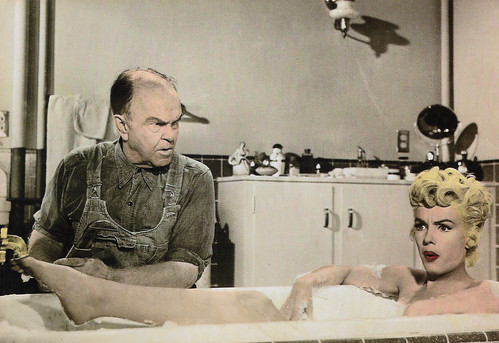
American postcard by Classico San Francisco, no. 105/001. Photo: Twentieth Century Fox / Charles K. Feldman Group Productions. Victor Moore and Marilyn Monroe in The Seven Year Itch (Billy Wilder, 1955).
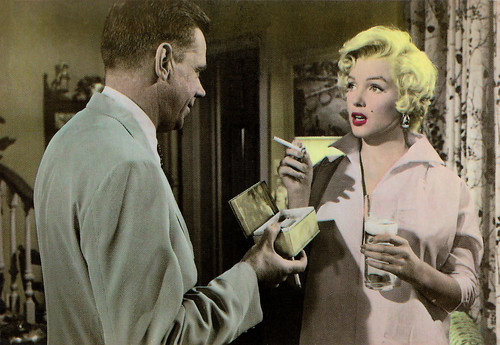
American postcard by Classico San Francisco, no. 105/002. Photo: Twentieth Century Fox / Charles K. Feldman Group Productions. Tom Ewell and Marilyn Monroe in The Seven Year Itch (Billy Wilder, 1955).
A husband left alone in the city for the dog days
The story of The Seven Year Itch (1955) is based on George Axelrod's 1952 play of the same name, which ran for years successfully on Broadway. It is summer and in New York, the temperature has risen to unbearable levels. Like many other family men, Richard Sherman (Tom Ewell), a middle-aged publishing executive, is left alone in the city for the dog days. He has sent his wife Helen (Evelyn Keyes) and their infant son Ricky (Tom Nolan) to much cooler Maine. He stayed behind because of work.
Richard is determined not to waste his time on drinking binges and love affairs like other husbands. But his resolutions are forgotten when he meets a voluptuous blonde actress and former model, The Girl (Marilyn Monroe). The Girl has temporarily rented the flat above the Shermans for the period she has to shoot commercials for toothpaste in Manhattan.
Sherman, a publishing executive, is reading a manuscript of a book by psychiatrist Dr Brubaker (Oscar Homolka), who claims that almost all men are driven to cheat in the seventh year of their marriage. The book tickles Sherman's fancy and he imagines himself having a conversation with Helen, trying to convince her, in three fantasy sequences, that he is irresistible to women, including his secretary (Marguerite Chapman), a nurse (Carolyn Jones), and Helen's bridesmaid (Roxanne), but she laughs it off.
Then a tomato plant falls onto his lounge chair from the balcony above him. When The Girl from upstairs apologises for accidentally knocking it off her balcony, Sherman invites her for a drink. While waiting for her to arrive, Sherman fantasises again and he passionately seduces The Girl while playing Rachmaninoff's 'Second Piano Concerto' on the piano. When he tries to embrace her in his daydream, she repels him and demands he leave.
When she does come down, she is wearing pink pyjamas and turns out to be a naïve and innocent young woman. On his suggestion, she brings back a bottle of champagne from her apartment and returns in a white dress. At first, Richard claims that he is unmarried until she notices his wedding ring. Overcome by his fantasies, he awkwardly grabs at her while they are playing 'Chopsticks' together on the piano, causing them to fall off the piano bench. He apologises, but she says it happens to her all the time. Feelings of guilt arise in him and he asks her to leave his flat.
In the following days, Sherman sees The Girl more and more often and his imagination runs overtime. Richard is attracted to her but cannot bring himself to have an affair. Although they are all dreams, Sherman slowly turns into a neurotic wreck. He sees in his dream how Helen and Ricky see on TV that The Girl warns them about the monster Sherman and not long after, Helen comes to town to take revenge on Sherman. The Girl appreciates him as a nice friend who, as a married man, unlike many other men, is not a "danger" to her.
Meanwhile, Richard's wife Helen calls several times to ask him to finally send the paddle which Ricky accidentally left behind, to the holiday camp so that their son can go kayaking. However, Richard's thoughts are so confused by the girl that he always forgets to send the paddle. Helen, meanwhile, has met the writer Tom MacKenzie (Sonny Tufts) on holiday, which leads to more paranoid daydreams for Richard, in which MacKenzie and his wife fall in love. When MacKenzie finally appears at Richard's flat to collect the long-forgotten paddle, Richard knocks him down. Plagued by jealousy, guilt and fear, Richard says goodbye to the girl in friendship. He tells her she can stay in his air-conditioned apartment, and he catches the first train to Maine to join his wife.
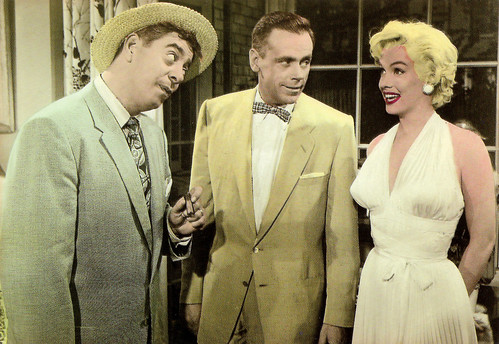
American postcard by Classico San Francisco, no. 105/003. Photo: Twentieth Century Fox / Charles K. Feldman Group Productions. Robert Strauss, Tom Ewell and Marilyn Monroe in The Seven Year Itch (Billy Wilder, 1955).
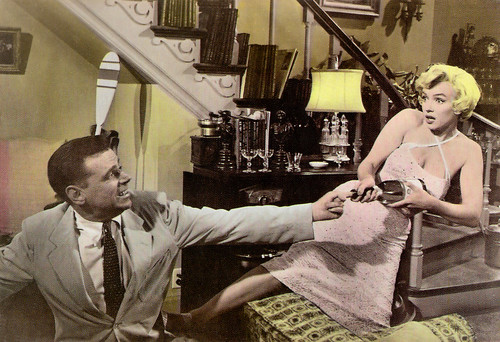
American postcard by Classico San Francisco, no. 105/004. Photo: Twentieth Century Fox / Charles K. Feldman Group Productions. Tom Ewell and Marilyn Monroe in The Seven Year Itch (Billy Wilder, 1955).

American postcard by Classico San Francisco, no. 105/005. Photo: Twentieth Century Fox / Charles K. Feldman Group Productions. Tom Ewell and Marilyn Monroe in The Seven Year Itch (Billy Wilder, 1955).

American postcard by Classico San Francisco, no. 105/006. Photo: Twentieth Century Fox / Charles K. Feldman Group Productions. Tom Ewell and Marilyn Monroe in The Seven Year Itch (Billy Wilder, 1955).
The absurdities of the male libido
Billy Wilder and George Axelrod changed a lot of Axelrod's original play when the two wrote the screenplay together. The character of Elaine disappeared as did the internal voices of Sherman and the Girl. On the other hand, they added several characters again, such as the nervous plumber (Victor Moore) and Kruhulik (Robert Strauss), the caretaker.
Many lines and scenes from the play were cut or re-written because they were deemed indecent by the Hays office which prohibited explicit sex in Hollywood films. George Axelrod and Billy Wilder complained that the film was being made under straitjacketed conditions. For this reason, the sex between Marilyn Monroe and Tom Ewell is only found in the latter's fantasy. In the play, the characters did have sex. In the film, Sherman and the Girl kiss three times, once while playing Sherman's piano together, once outside the cinema where they see Creature from the Black Lagoon (Jack Arnold, 1954) and once near the end before Sherman goes to take Ricky's paddle to him.
For the role of Richard Sherman, Billy Wilder preferred an average-looking guy. Walter Matthau auditioned, but Ewell was eventually chosen. Both men's screen tests have been preserved. Wilder himself was very keen on Matthau, but the studio did not want a debutant. Tom Ewell played the lead role in the original Broadway production and won a Tony Award for his role.
Billy Wilder filmed between 1 September and 4 November 1954, both in the Los Angeles studio and on location. The exterior shots of Sherman's flat, for instance, were shot at 164 East 61st Street in Manhattan. The scene with Monroe above the air vent was originally shot at the corner of 52nd Street and Lexington Avenue in New York. The disruption by screaming and cheering crowds was useful for the film's publicity but the recorded material was unusable. After this, the scene was filmed again in Hollywood at the 20th Century Fox studio.
The idea of a dress blowing up over an air vent was not new. The two-minute silent film What Happened on Twenty-third Street, New York City (George S. Fleming, Edwin S. Porter, 1901) is an early film version of the scene. It also happened to Stan Laurel's kilt in the first film in which Laurel and Hardy worked together as a duo: Putting Pants on Philip (Clyde Bruckman, 1927). In 1941, a photograph by Sam Shaw appeared on the cover of Friday magazine showing girls whose skirts were blowing up over an air vent. Shaw was a friend of Marilyn Monroe and she is said to have introduced the idea to Wilder. The iconic photo with Monroe above the ventilation shaft was shot again by Shaw.
Wilder did not have an easy time with his leading lady. Forty shots were needed for the famous scene over the air vent alone. Monroe suffered from depression and regularly forgot her lines. If she uttered the text at all, it was often impossible to understand and Wilder often needed dozens of shots to get everything right. Saul Bass created the abstract title sequence for the film, which was mentioned favourably in numerous reviews. Up until that time, it was unheard of for trade press reviews to mention film title sequences.
In his review at AllMovie, Brendon Hanley writes: "The Seven Year Itch parodies images of conventional Hollywood romances. Writer-director Billy Wilder takes jabs at several popular films of the era, including From Here to Eternity (1953) and Brief Encounter (1945), as he plunders the absurdities of the male libido. Of course, there was no better epitome of 1950s male sexual fantasy than Marilyn Monroe, ideally cast as The Girl. Itch is further proof of Monroe's underrated comic skills, particularly in parts which allowed her to poke fun at her own image. Best remembered for its skirt-blowing scene, the film was actually a toned-down version of an even bawdier stage play. Wilder still manages to retain some of the play's naughtier puns and innuendo."
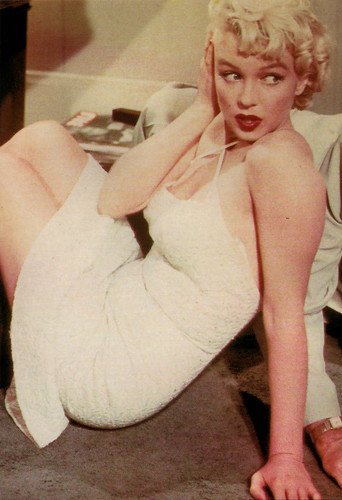
American postcard by Classico San Francisco, no. 105/031. Marilyn Monroe and Tom Ewell in The Seven Year Itch (Billy Wilder, 1955).

Vintage postcard. Tom Ewell and Marilyn Monroe in The Seven Year Itch (Billy Wilder, 1955).

Swiss postcard by CVB Productions, Grandson / News Productions, no. CCP 46, 1996. Photo: Sam Shaw. Tom Ewell and Marilyn Monroe in The Seven Year Itch (Billy Wilder, 1955).
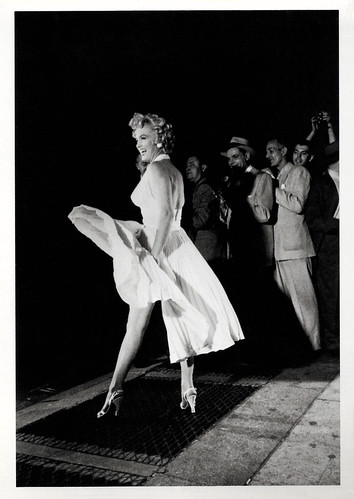
American postcard by Fotofolio, New York, no. MP65. Photo: Elliot Erwitt. Marilyn Monroe and Tom Ewell at the set of The Seven Year Itch (Billy Wilder, 1955).
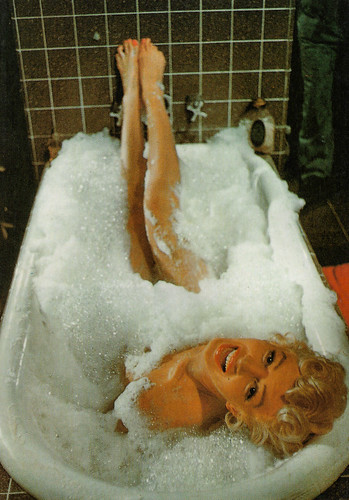
French postcard, no. 1418. Photo: Sam Shaw. Marilyn Monroe in The Seven Year Itch (Billy Wilder, 1955).
Sources: Brendon Hanley (AllMovie), Wikipedia (Dutch, German and English), and IMDb.
This post was last updated on 10 December 2022.
No comments:
Post a Comment